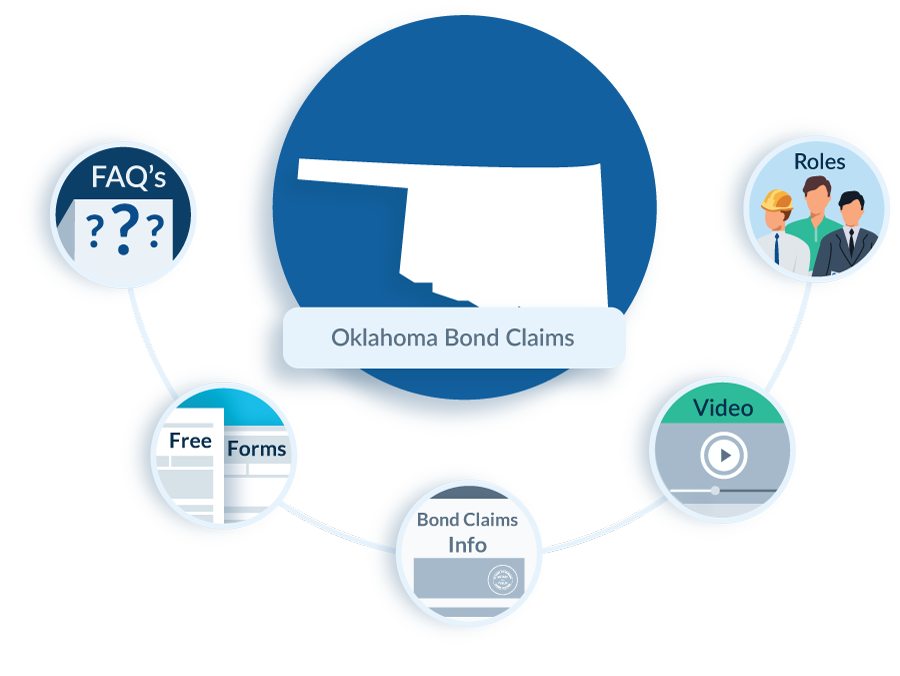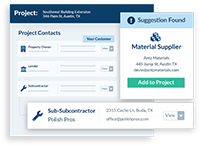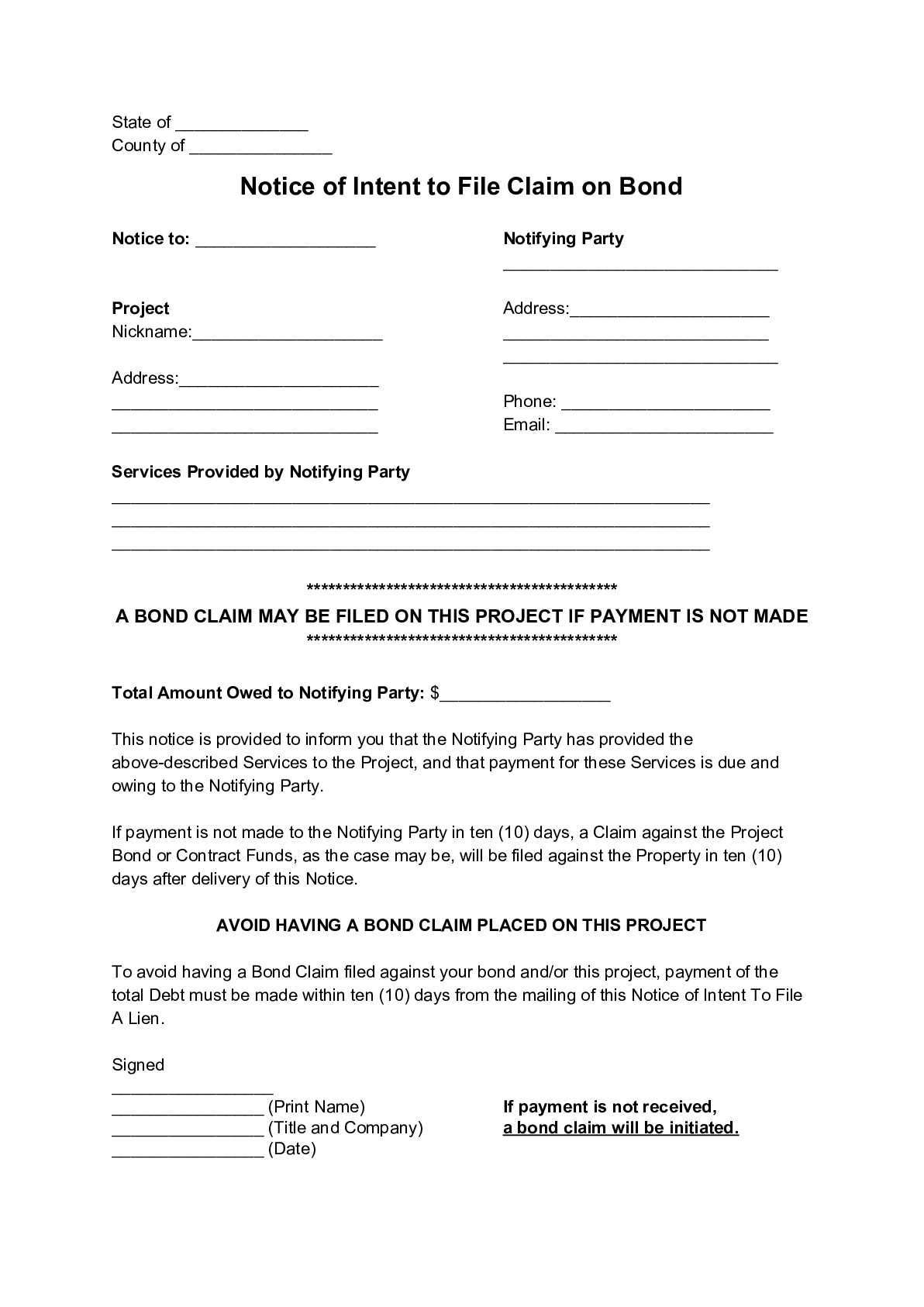Oklahoma
Preliminary Notice Deadlines
Oklahoma
Oklahoma
Oklahoma
Oklahoma
Oklahoma
For those who did not contract with the prime, must file a bond claim with the prime contractor within 90 days of last furnishing labor or materials to the project (good practice for those who did contract with prime as well). Enforcement lawsuit must be filed within 1 year of the same last furnishing date.
Oklahoma
Oklahoma
For those who did not contract with the prime, must file a bond claim with the prime contractor within 90 days of last furnishing labor or materials to the project (good practice for those who did contract with prime as well). Enforcement lawsuit must be filed within 1 year of the same last furnishing date.
In Oklahoma, subcontractors, laborers, and material suppliers are all protected, apparently regardless of project tier. It is unclear if suppliers to suppliers are protected.


A bond claim in Oklahoma must be received within 90 days of the claimant’s last furnishing of labor and/or materials to the project.


The bond claim must be sent to the general contractor, and the surety. It may also be advisable to send notice of the bond claim to the contracting public entity.


An action to enforce the bond claim must be initiated within 1 year from the claimant’s last furnishing of labor and/or materials to the project.


The only required information to be included on a bond claim in Oklahoma is a statement of the amount due to the claimant, and the name of the party to whom the claimant furnished labor and/or materials. It may be advisable to also include the name of the claimant, general contractor, and public entity, and a description of the project and the labor and/or material furnished.


Oklahoma does not have statutory lien waiver forms, and therefore, you can use any lien waiver forms. Since lien waivers are unregulated, be careful when reviewing and signing lien waivers. See this article: Should You Sign That Lien Waiver?.
Oklahoma state law is unclear or silent about whether contractors and suppliers can waive their lien rights before any work on the project begins. Accordingly, you want to proceed with caution on this subject. You can learn more about such “no lien clauses” at this article: Where Can You Waive Your Lien Rights Before Payment?


Maybe. Suppliers to suppliers may be able to file a bond claim in Oklahoma. The law is not clear.


A bond claim in Oklahoma should be sent by registered mail or certified mail.


I'm a subcontractor that and I finished my part of this commercial project back in July and I have yet to be paid. The project was completed a few days ago and they're requesting close out documents retainage, warranties etc. I believe the General Contractor disagrees with my itemized final payment...
Can I file a mechanics lien?I'm a subcontractor that was working on a job in Oklahoma. We left the job because we had multiple invoices that had not been paid. The Subcontractor that we were under said they had placed a claim on the bond of the contractor. This was back in March and our deadline to place a lien on the...
Can we file a bond claim after a Mechanics lien was filed?Hello, If we filed a Mechanics Lien on a project, and now the GC for the project is advising us that the subcontractor has a payment and performance bond & is requesting us to file a bond claim, how does that affect the Mechanics Lien that was filed? Can we file a bond claim on top of the...


A Notice of Intent to Make Bond Claim is not a required document, but it can be a powerful one. By sending this notice, a claimant...
When you perform work on a state construction project in Oklahoma, and are not paid, you can file a “lien” against the project pursuant to Oklahoma’s Little Miller Act. Since the claim is not against the state or county’s actual property, but instead against a posted bond, the claim is not really called a “lien” but is more frequently referred to as a “bond claim” or “little miller act claim.” Updated as of 2022.
[Effective until November 1, 2022]
A. Prior to an award of a contract exceeding Fifty Thousand Dollars ($50,000.00) for construction or repair of a public or private building, structure, or improvement on public real property, the person that receives the award shall:
1. Furnish a bond with good and sufficient sureties payable to the state in a sum not less than the total sum of the contract; or
2. Cause an irrevocable letter of credit, containing terms the Office of Management and Enterprise Services prescribes, to be issued for the benefit of the state by a financial institution insured by the Federal Deposit Insurance Corporation in a sum not less than the total sum of the contract.
B. The bond or irrevocable letter of credit shall ensure the proper and prompt completion of the work in accordance with the contract and shall ensure that the contractor shall pay all indebtedness the contractor incurs for the contractor’s subcontractors and all suppliers of labor, material, rental of machinery or equipment, and repair of and parts for equipment the contract requires the contractor to furnish.
C. For a contract not exceeding Fifty Thousand Dollars ($50,000.00), in lieu of a bond or irrevocable letter of credit, the contractor shall submit an affidavit of the payment of all indebtedness incurred by the contractor, the contractor’s subcontractors, and all suppliers of labor, material, rented machinery or equipment, and repair of and parts for equipment used or consumed in the performance of the contract. The execution of the affidavit with knowledge that any of the contents of the affidavit are false, upon conviction, shall constitute perjury, punishable as provided for by law.
[Effective November 1, 2022]
A. Prior to an award of a contract exceeding One Hundred Thousand Dollars ($100,000.00) for construction or repair of a public or private building, structure, or improvement on public real property, the person that receives the award shall furnish a bond with good and sufficient sureties payable to the state in a sum not less than the total sum of the contract.
B. The bond shall ensure the proper and prompt completion of the work in accordance with the contract and shall ensure that the contractor shall pay all indebtedness the contractor incurs for the contractor’s subcontractors and all suppliers of labor, material, rental of machinery or equipment, and repair of and parts for equipment the contract requires the contractor to furnish.


A. Bonds shall be filed in the office of the agency, institution, department, commission, municipality or government instrumentality that is authorized by law and does enter into contracts for the construction of public improvements or buildings, or public or private improvements or buildings on a public-private partnership project, or repairs to the same; and the officer with whom the bond is filed shall furnish a copy thereof to any person claiming any rights thereunder. Any person to whom there is due any sum for labor, material or repair to machinery or equipment, furnished as stated in Section 1 of this title, the heirs or assigns of such person, may file a claim or bring an action on the bond for the recovery of the indebtedness, provided that no action shall be brought on the bond after one (1) year from the day on which the last of the labor was performed or material or parts furnished for which the claim is made unless a prior claim has been filed within one (1) year from the day on which the labor was performed or material or parts furnished, in which case, no action shall be brought on the bond after two (2) years from the day on which the last of the labor was performed or material or parts furnished for which the claim is made.
B.
1. Any person having direct contractual relationship with a subcontractor, regardless of tier, performing work on the contract, but no contractual relationship express or implied with the contractor furnishing the payment bond, shall have a right of action upon the payment bond only upon giving written notice to the contractor and surety on the payment bond within ninety (90) days from the date on which such person did or performed the last of the labor or furnished or supplied the last of the material or parts for which the claim is made, stating with substantial accuracy the amount claimed and the name of the party to whom the material or parts were furnished or supplied or for whom the labor was done or performed. The notice shall be served by mailing the same by registered or certified mail, postage prepaid, in an envelope addressed to the contractor at any place the contractor maintains an office or conducts business, together with a copy thereof to the surety or sureties on the payment bond.
2. With regard to an at-risk construction management contract under which the at-risk construction manager or a trade contractor under either an agency or an at-risk construction management contract is required to furnish a payment bond, only persons having a direct contractual relationship with the party furnishing the payment bond shall have a right of action upon the payment bond in the same manner as set forth in subsection A of this section.
C.
1. The bond or irrevocable letter of credit issued to the Department of Transportation or the Oklahoma Turnpike Authority, pursuant to this section, shall also provide that the contractor shall pay all state and local taxes accruing as a result of the contract, any liquidated damages as provided by the contract and any overpayment of progressive estimates resulting in a balance due and owing the Department of Transportation or the Oklahoma Turnpike Authority.
2. A claim against the bond or irrevocable letter of credit for delinquent taxes shall be made by the public entity to which the tax was payable. The claim shall be made within six (6) months from the date on which the tax became delinquent. Notice of the delinquent tax shall be sent by certified mail to the surety, and a copy of the notice shall be sent to the contractor. Nothing in this paragraph shall be construed to release, at any time, the contractor from responsibility for full payment of all taxes.
3. A claim against the bond or irrevocable letter of credit for overpayment on progressive estimates shall be made by the public entity within one (1) year from the date of final acceptance of the project. Notice of the overpayment shall be sent by certified mail to the surety and a copy of the notice shall be sent to the contractor. Nothing in this paragraph shall be construed as to release, at any time, the contractor from the responsibility of refunding any amount overpaid on progressive estimates which are due and owing the Department of Transportation.


(a) For the purpose of this act the term “contractor” means an individual, general partnership, limited partnership, joint venture, association, corporation or a combination of any of the foregoing who does or undertakes for compensation the construction of any public works.
(b) The term “public works” for the purpose of this act means the construction, alteration, repair, improvement, moving, wrecking or demolition of any highway, road, railroad, earthwork, building or other structure, project, development or improvement, whether it be in whole or in part.


This act shall not apply to any contractor who is qualified for bidding purposes with the Oklahoma State Highway Department and submits a successful bid wherein part of or the entire funds are furnished by the United States Government.
[Repealed effective November 1, 2022]


[Effective until November 1, 2022]
All bids, both successful and unsuccessful, and all contracts and required bonds shall be placed on file and maintained in the main office of the awarding public agency for a period of five (5) years from the date of opening of bids or for a period of three (3) years from the date of completion of the contract, whichever is longer, shall be open to public inspection and shall be matters of public record.
[Effective November 1, 2022]
All bids, both successful and unsuccessful, and all contracts and required bonds shall be placed on file and maintained by the awarding public agency for a period of five (5) years from the date of opening of bids or for a period of three (3) years from the date of completion of the contract, whichever is longer, and shall be open to public inspection and shall be matters of public record.

